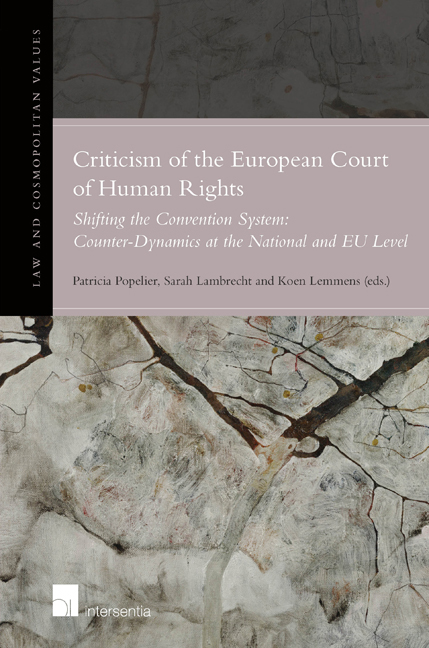 Criticism of the European Court of Human Rights
Criticism of the European Court of Human Rights Book contents
- Frontmatter
- Contents
- List of Abbreviations
- PART I INTRODUCTORY
- PART II SPARSE CRITICISM
- PART III MODERATE CRITICISM
- Chapter 11 France: “Jet'aime, moi non plus”
- Chapter 12 Hungary: ‘Gains and Losses'. Changing the Relationship with the European Court of Human Rights
- Chapter 13 The Netherlands: Political Dynamics, Institutional Robustness
- Chapter 14 Norway: New Constitutionalism, New Counter-Dynamics?
- Chapter 15 Switzerland: The Substitute Constitution in Times of Popular Dissent
- Chapter 16 Turkey: The European Convention on Human Rights as a Tool for Modernisation
- PART IV STRONG CRITICISM
- PART V HOSTILE CRITICISM
- PART VI SYNTHESIS
- APPENDIX
Chapter 13 - The Netherlands: Political Dynamics, Institutional Robustness
from PART III - MODERATE CRITICISM
Published online by Cambridge University Press: 13 December 2017
- Frontmatter
- Contents
- List of Abbreviations
- PART I INTRODUCTORY
- PART II SPARSE CRITICISM
- PART III MODERATE CRITICISM
- Chapter 11 France: “Jet'aime, moi non plus”
- Chapter 12 Hungary: ‘Gains and Losses'. Changing the Relationship with the European Court of Human Rights
- Chapter 13 The Netherlands: Political Dynamics, Institutional Robustness
- Chapter 14 Norway: New Constitutionalism, New Counter-Dynamics?
- Chapter 15 Switzerland: The Substitute Constitution in Times of Popular Dissent
- Chapter 16 Turkey: The European Convention on Human Rights as a Tool for Modernisation
- PART IV STRONG CRITICISM
- PART V HOSTILE CRITICISM
- PART VI SYNTHESIS
- APPENDIX
Summary
CRITICISM OF THE EUROPEAN COURT OF HUMAN RIGHTS
DEVELOPMENT AND LOCUS OF THE DUTCH DEBATE ON THE ROLE OF THE COURT
The Netherlands is well-known for its advocacy of international human rights. For many it therefore came as a surprise that a critical debate about the Court emerged in the autumn of 2010. In November 2010, academic Thierry Baudet published an opinion in a national newspaper in which he criticised the Court for being overly intrusive and for violating national sovereignty. His opinion sparked a heated debate on the Court's role and legitimacy, which was partly conducted in the media and academia, and partly in the political arena. Several scholars contributed to the debate by publishing opinions and articles in national newspapers and in academic journals. Most of these opinions defended the Court and its work, but some stressed the Court's lack of legitimacy or at the least made critical remarks about its case law. The political criticism and the criticism expressed in scholarly opinions concentrated on the far-reaching character of the judgments of the ECtHR, the Court's position as an international court and the Court's inherently undemocratic character. The critics stressed that the Court had over-extended the scope of the Convention and that, as a result, it was deciding many cases that are not actually related to fundamental rights issues. In such cases, the critics stated, the Court was simply imposing its own view on national authorities, disrespecting both national sovereignty and the democratic legitimacy of national legislation. Thus the Court was presented as an antimajoritarian body; as an outsider meddling with national policy choices with a disregard for national traditions and opinions.
Several political parties, in particular the populist right-wing Party for Freedom (PVV) and the Liberal Party (VVD), took up such criticism of the Court. In particular in debates on matters of immigration and social security legislation, Members of Parliament (MPs) for these parties expressed themselves in negative terms about the interference of the ECtHR in such matters. The minority coalition Cabinet (a coalition of the VVD and the Christian Democrats (CDA), supported in Parliament by the PVV), initially appeared to support at least part of this criticism.
- Type
- Chapter
- Information
- Criticism of the European Court of Human RightsShifting the Convention System: Counter-dynamics at the National and EU Level, pp. 327 - 360Publisher: IntersentiaPrint publication year: 2016
- 2
- Cited by
